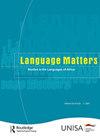Challenges to the Acquisition of Literacy in Rural Primary Schools in Northern Uganda
IF 0.8
3区 文学
0 LANGUAGE & LINGUISTICS
引用次数: 4
Abstract
Abstract Literacy in the early years is crucial but attained amidst various challenges, especially in the Global South. Based on fieldwork conducted in October 2018 in four primary schools in Gulu district, Acoli region, northern Uganda, this study investigates school characteristics and facilities available to learners and teachers to scaffold the acquisition of literacy in the early years of schooling. These are discussed within the framework of Uganda’s mother-tongue education programme with a focus on the challenges of literacy acquisition. Data were collected from four schools by means of questionnaires, classroom interactions, and interviews, and were analysed through triangulation. The findings suggest that there are difficulties to attaining literacy within the MT education programme. Some of the challenges relate to teachers’ attitudes and practices, lack of school materials, poor school conditions, and large learner numbers per class. The implications of the observed challenges to literacy acquisition are discussed.乌干达北部农村小学识字面临的挑战
早期识字至关重要,但要在各种挑战中实现,特别是在全球南方。本研究基于2018年10月在乌干达北部阿科利地区Gulu区的四所小学进行的实地调查,调查了学校的特点和为学生和教师提供的设施,以帮助他们在上学早期获得识字能力。在乌干达母语教育方案的框架内讨论这些问题,重点是识字的挑战。本研究以问卷调查、课堂互动及访谈等方式收集四所学校的资料,并透过三角测量法进行分析。研究结果表明,在MT教育计划中实现识字存在困难。其中一些挑战与教师的态度和做法、缺乏教材、学校条件差以及每班学生人数多有关。本文讨论了所观察到的识字习得挑战的含义。
本文章由计算机程序翻译,如有差异,请以英文原文为准。
求助全文
约1分钟内获得全文
求助全文
来源期刊

Language Matters
Multiple-
CiteScore
1.20
自引率
0.00%
发文量
19
期刊介绍:
The purpose of Language Matters is to provide a journal of international standing with a unique African flavour focusing on multilingualism in Africa. Although the journal contributes to the language debate on all African languages, sub-Saharan Africa and issues related to multilingualism in the southern African context are the journal’s specific domains. The journal seeks to promote the dissemination of ideas, points of view, teaching strategies and research on different aspects of African languages, providing a forum for discussion on the whole spectrum of language usage and debate in Africa. The journal endorses a multidisciplinary approach to the study of language and welcomes contributions not only from sociolinguists, psycholinguists and the like, but also from educationalists, language practitioners, computer analysts, engineers or scholars with a genuine interest in and contribution to the study of language. All contributions are critically reviewed by at least two referees. Although the general focus remains on multilingualism and related issues, one of the three issues of Language Matters published each year is a special thematic edition on Language Politics in Africa. These special issues embrace a wide spectrum of language matters of current relevance in Southern Africa.
 求助内容:
求助内容: 应助结果提醒方式:
应助结果提醒方式:


